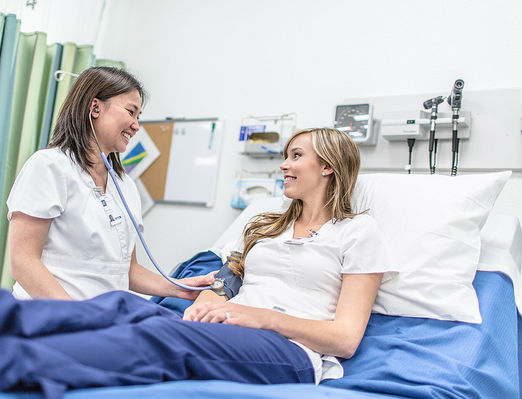University General Course Catalog 2017-2018 ARCHIVED CATALOG: LINKS AND CONTENT ARE OUT OF DATE. CHECK WITH YOUR ADVISOR.
Orvis School of Nursing
|
|

225 Orvis School of Nursing
(775) 784-6841
Bachelor of Science in Nursing
The bachelor’s degree program is designed to provide the high school graduate, as well as graduates of associate degree and diploma nursing with the opportunity to obtain a baccalaureate degree in nursing. Registered Nurses seeking to complete a Bachelor’s Degree in Nursing see the RN-BSN section. The bachelor’s degree program is the basic preparation for professional nursing practice and leadership positions in nursing. After completing the program, the graduate is qualified for nursing positions in public health agencies, schools, hospitals and other health-care providers. Nursing school graduates may also earn commissioned status in the military services, as well as admission to graduate education. The bachelor’s degree program major is four semesters with admissions occurring both spring and fall semesters. See criteria below.
The baccalaureate degree program is approved by the Nevada State Board of Nursing and accredited by the Commission on Collegiate Nursing Education (CCNE).
Pre-nursing major students must complete the Core Curriculum requirements below in addition to the nursing prerequisites before entering the nursing major. No grade below C in any course will be accepted as applicable to the nursing degree.
Master of Science in Nursing
Graduate education at the MSN level prepares registered nurses for advanced practice, educator and leadership positions in health care. MSN level study develops clinical competence and increased sophistication in exploring and identifying a theoretical framework for nursing practice.
MSN education also serves as an introduction to scholarly activity for those who wish to pursue the doctoral degree in nursing. Research focuses on the search for nursing knowledge, analysis and evaluation of nursing theory and the study of strategies for nursing application. MSN education also provides students with the opportunity to realize their creative potential and collaborate with other health care professionals in maintaining effective nursing and health care.
The master’s degree program offers three specializations: clinical nurse leader, family nurse practitioner, and nurse educator. Post-master’s family nurse practitioner, clinical nurse leader, and nurse educator certifications are also available. The MSN program is accredited by the Commission on Collegiate Nursing Education (CCNE).
Graduate Program Objectives
- Integrates scientific findings from nursing, biopsychosocial fields, genetics, public health, quality improvement, and organizational sciences for the continual improvement of nursing care across diverse settings.
- Provide advanced, ethical, evidence-based nursing services for multi-cultural and ethnic individuals, families, aggregates, and select populations.
- Apply patient-care and communication technologies to deliver, enhance, integrate, and coordinate care.
- Collaborate with other professionals and members of the community to provide optimal health care to individuals, families, special populations, and communities with an emphasis on health promotion and disease prevention.
- Respect diversity and address complex health care needs of persons, including the un-served and under-served, populations and communities, in the role of nurse leader, educator, and/or advanced practice nurse.
- Participate in the ethical organization, management, and policy negotiations of health care delivery systems to use advocacy strategies to influence health and healthcare.
- Participate in the application of safe patient care and quality health care practices.
- Participate in the development of nursing as a science, through the use of theory, research, and scientific processes while acquiring a foundation for doctoral study.
Academic Admission to the Master of Science in Nursing Major
This is a two-step process, wherein the applicant must first meet the university’s Graduate School requirements as well as the Orvis School of Nursing MSN requirements. Both schools must receive all application materials on or before March 1 for consideration for the fall semester.
- Have an overall undergraduate grade-point average of at least 3.0.
- Complete a baccalaureate degree with an upper-division major in nursing from an NLNAC-or CCNE accredited nursing school. The baccalaureate degree curriculum must include the following specific course work:
- Statistics;
- Growth and development (must cover lifespan);
- Basic research;
- Health assessment
- Have verification of current licensure to practice as a registered nurse in the United States. Students must be eligible to practice as a registered nurse in Nevada;
- Submit a statement of intent including graduate-study goals;
- Provide three letters of reference to the graduate program director using the form on the OSN website.
- Successful completion of a graduate level applied statistics course prior to fall admission.
- Submit scores for the Graduate Record Exam (GRE). (Optional, required for those students applying for the MSN/MPH program of study).
An interview may be required.
The total of required units for completing the degree varies according to the option the student selects. The minimum number of required units for completion of the MSN is 35. With graduate advisor approval, MSN students may apply more than 3 S/U units to the 35 units required.
Applicants who plan to apply graduate-level credit earned at another university to the University of Nevada, Reno may be able to satisfy specific course requirements in the nursing program. Applicants must provide specific course information for review to determine if the transferred courses are equivalent to university requirements. If approved, such courses may be included in the official program of study.
Grade Requirements
MSN students must maintain a minimum grade of “B” in each required graduate level nursing course. Students who receive grades below “B” may repeat one course one time.
Prerequisite for 700-level Nursing Courses
Prerequisites for 700-level nursing courses are: admission to both the Graduate School and the graduate program of the Orvis School of Nursing or permission of the graduate program coordinator.
A graduate level statistics course must be completed prior to enrollment in NURS 735 - Intro to Knowledge Development and Scientific Inquiry. Please contact the OSN Graduate Coordinator for information on admission as a graduate special student.
|